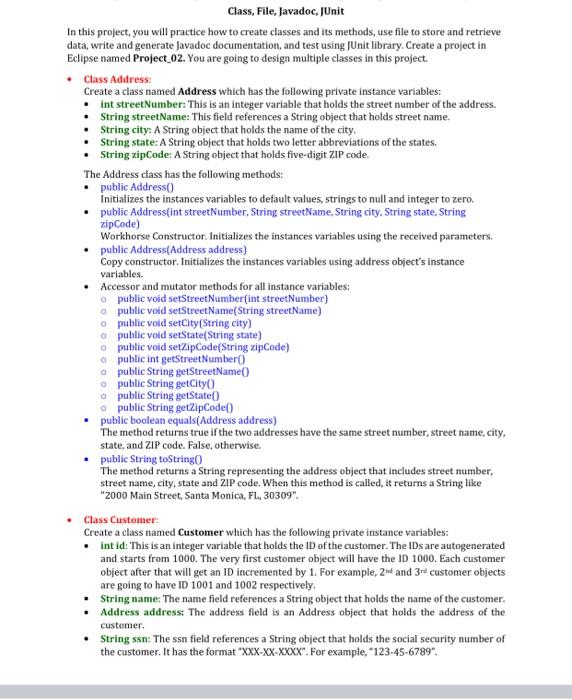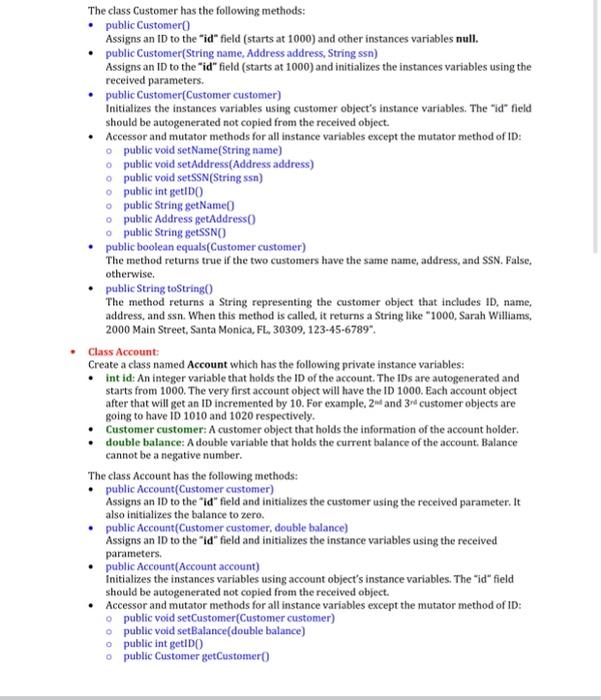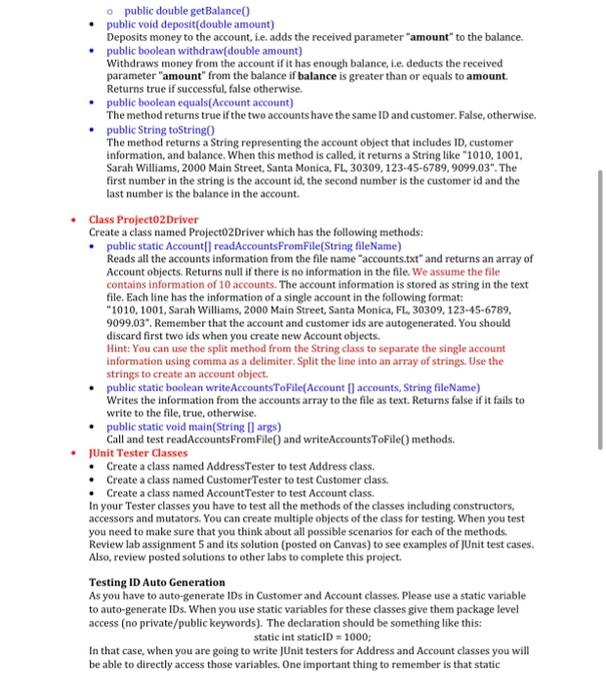Question: JAVA the this method should help Class, File, Javadoc, JUnit In this project, you will practice how to create classes and its methods, use file




Class, File, Javadoc, JUnit In this project, you will practice how to create classes and its methods, use file to store and retrieve data, write and generate Javadoc documentation, and test using JUnit library. Create a project in Eclipse named Project_02. You are going to design multiple classes in this project. Class Address: Create a class named Address which has the following private instance variables: int street Number: This is an integer variable that holds the street number of the address. String streetName: This field references a String object that holds street name. String city: A String object that holds the name of the city. String state: A String object that holds two letter abbreviations of the states. String zipCode: A String object that holds five-digit ZIP code The Address dass has the following methods: public Address Initializes the instances variables to default values, strings to null and integer to zero. public Address(int streetNumber, String streetName, String city. String state. String zip Code) Workhorse Constructor. Initializes the instances variables using the received parameters. public Address(Address address) Copy constructor. Initializes the instances variables using address object's instance variables. Accessor and mutator methods for all instance variables: public void setStreetNumber(int streetNumber) public void setStreetName(String streetName) o public void setCity(String city) o public void setState(String state) o public void setZipCode(String zipCode) o public int getStreet Number o public String getStreetName public String getCity public String getState o public String getZipCode public boolean equals(Address address) The method returns true if the two addresses have the same street number, street name, city, state, and ZIP code. False, otherwise. public String toStringo The method returns a String representing the address object that includes street number, street name, city, state and ZIP code. When this method is called, it returns a String like "2000 Main Street, Santa Monica, FL, 30309" Class Customer Create a class named Customer which has the following private instance variables: int id: This is an integer variable that holds the ID of the customer. The IDs are autogenerated and starts from 1000. The very first customer object will have the ID 1000. Each customer object after that will get an ID incremented by 1. For example, 2 and 3 customer objects are going to have ID 1001 and 1002 respectively, String name: 'The name field references a String object that holds the name of the customer. Address address: The address field is an Address object that holds the address of the customer, String ssn: The ssn field references a String object that holds the social security number of the customer. It has the format "XXX-XX-XXXX". For example, "123-45-6789". The class Customer has the following methods: public Customer Assigns an ID to the "id" field (starts at 1000) and other instances variables null. public Customer(String name Address address, String ssn) Assigns an ID to the "id" field (starts at 1000) and initializes the instances variables using the received parameters, public Customer(Customer customer) Initializes the instances variables using customer object's instance variables. The id field should be autogenerated not copied from the received object. Accessor and mutator methods for all instance variables except the mutator method of ID: public void setName(String name) public void setAddress(Address address) o public void setSSN(Stringssn) public int getIDO o public String getNamel public Address getAddress o public String getSSNO public boolean equals(Customer customer) The method returns true if the two customers have the same name, address, and SSN. False. otherwise. public String toString() The method returns a String representing the customer object that includes ID, name, address, and ssn. When this method is called, it returns a String like "1000. Sarah Williams 2000 Main Street, Santa Monica, FL, 30309, 123-45-6789". Class Account: Create a class named Account which has the following private instance variables: int id: An integer variable that holds the ID of the account. The IDs are autogenerated and starts from 1000. The very first account object will have the ID 1000. Each account object after that will get an ID incremented by 10. For example2 and 3 customer objects are going to have ID 1010 and 1020 respectively. Customer customer: A customer object that holds the information of the account holder double balance: A double variable that holds the current balance of the account. Balance cannot be a negative number. The class Account has the following methods: public Account(Customer customer) Assigns an ID to the "id" field and initializes the customer using the received parameter. It also initializes the balance to zero. public Account (Customer customer, double balance) Assigns an ID to the "id" field and initializes the instance variables using the received parameters. public Account(Account account) initializes the instances variables using account object's instance variables. The "id"field should be autogenerated not copied from the received object. Accessor and mutator methods for all instance variables except the mutator method of ID: public void setCustomer(Customer customer) public void setBalance(double balance) o public int getIDO public Customer getCustomer o public double getBalance public void deposit(double amount) Deposits money to the account, i.e. adds the received parameter "amount to the balance. public boolean withdraw(double amount) Withdraws money from the account if it has enough balance, t.e. deducts the received parameter "amount" from the balance if balance is greater than or equals to amount Returns true if successful, false otherwise. public boolean equals(Account account) The method returns true if the two accounts have the same ID and customer. False, otherwise. public String toStringo The method returns a String representing the account object that includes ID, customer information, and balance. When this method is called, it returns a String lice "1010, 1001, Sarah Williams, 2000 Main Street, Santa Monica, FL, 30309, 123-45-6789, 9099.03". The first number in the string is the account id, the second number is the customer id and the last number is the balance in the account. Class Projecto2Driver Create a class named Projecto2Driver which has the following methods: public static Account[] readAccountsFromFile(String fileName) Reads all the accounts information from the file name accounts.txt" and returns an array of Account objects. Returns null if there is no information in the file. We assume the file contains information of 10 accounts. The account information is stored as string in the text file. Each line has the information of a single account in the following format: "1010, 1001, Sarah Williams, 2000 Main Street, Santa Monica, FL, 30309,123-45-6789, 9099.03. Remember that the account and customer ids are autogenerated. You should discard first two lds when you create new Account objects. Hint: You can use the split method from the String class to separate the single account information using comma as a delimiter. Split the line into an array of strings. Use the strings to create an account object. public static boolean write Accounts ToFile(Account | accounts, String fileName) Writes the information from the accounts array to the file as text. Returns false if it fails to write to the file, true, otherwise. public static void main(String[] args) Call and test readAccountsFromFile() and writeAccountsToFile() methods. JUnit Tester Classes Create a class named Address Tester to test Address class. Create a class named CustomerTester to test Customer class. Create a class named Account Tester to test Account class. in your Tester classes you have to test all the methods of the classes including constructors, accessors and mutators. You can create multiple objects of the class for testing. When you test you need to make sure that you think about all possible scenarios for each of the methods. Review lab assignment 5 and its solution (posted on Canvas) to see examples of JUnit test cases, Also, review posted solutions to other labs to complete this project. Testing ID Auto Generation As you have to auto-generate IDs in Customer and Account classes. Please use a static variable to auto-generate IDs. When you use static variables for these classes give them package level access (no private/public keywords). The declaration should be something like this: static int staticID = 1000; In that case, when you are going to write JUnit testers for Address and Account classes you will be able to directly access those variables. One important thing to remember is that static variables retain the value it has between the test cases in JUnit testing. You must reset static variables to starting value for each test method using a statement like this: Customer.staticID = 1000; or Account.staticID = 1000
Step by Step Solution
There are 3 Steps involved in it

Get step-by-step solutions from verified subject matter experts


